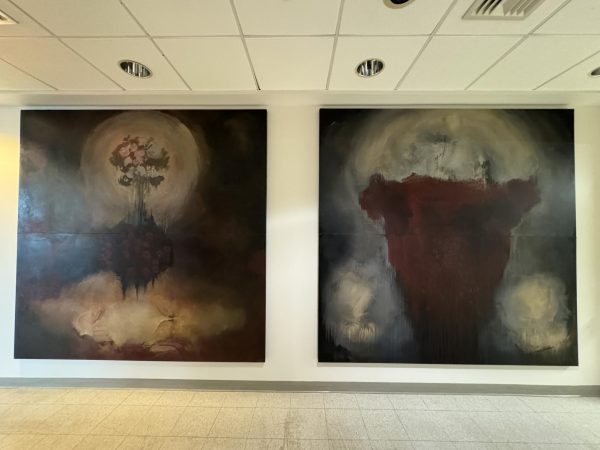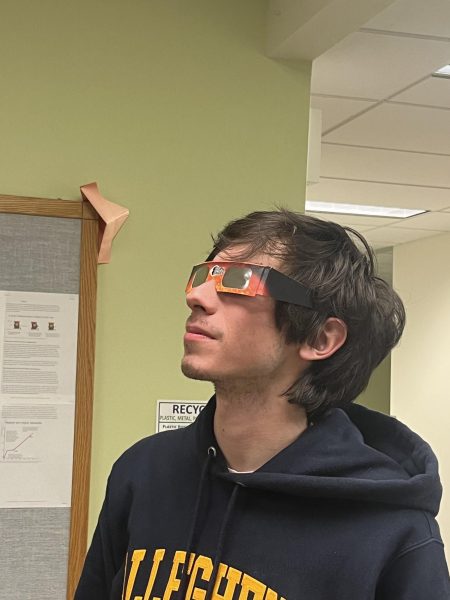Lombardi reveals love is not found in the stars
The stars aligned for some Allegheny students this year.
For one night every year, Allegheny’s Astronomy Club transforms into the astrology club to help students find love.
“We are the astronomy club, but around Valentine’s Day, we turn to the astrology club,” said Diptajyoti Mukherjee, ’19.
On Feb. 15, the astronomy club held its annual star-crossed lovers event in Carr Hall. Approximately 80 students who were looking for love attended the event.
Students could sign up as either a couple or as an individual looking to be placed on a blind date by the astronomy club board.
The board did not reveal the matches until the event began.
“It looked like a fun thing, and I want to try as many new things as possible,” said Tanner Kolb, ’22.
Prior to attending the event, students filled out a questionnaire that was comprised of a diverse set of questions ranging from their astrological sign to their least favorite song.
“We usually try to match people based on their horoscopes,” Mukherjee said. “Sometimes that happens. Sometimes that doesn’t happen.”
Upon arrival, students were met with a table full of pizza, soda and snacks outside the Carr Hall Planetarium, with the wall beside the treats covered in paper hearts.
Half a heart was designated to each student. Students who signed up as a couple received a full heart with one of their names printed on each side. Students who signed up in hopes of finding love received half a heart that matched with someone else’s half.
“I did it because I thought it would be an interesting way to spend a Friday night,” said Kyle Dipofi, ’22. “I’m nervous, but I’m always nervous.”
Once students pulled their hearts from the wall, the mingling began. Participants spent about half an hour getting to know each other before heading into the planetarium.
Once inside, James Lombardi, associate professor of astronomy gave a presentation about astrology, but first, Lombardi asked students to raise their hands if they had never been inside the planetarium. Over half of the students who attended raised their hands.
Lombardi began the presentation by introducing the 13 zodiac constellations: Capricorn, Aquarius, Pisces, Aries, Taurus, Gemini, Cancer, Leo, Virgo, Libra, Scorpio, Ophiuchus and Sagittarius.
Many people are familiar with the 12 zodiac signs, which excludes Ophiuchus.
Approximately 3,000 years ago, the Babylonians created the astrological calendar by first dividing the sky into 12 sections. Each section corresponds to a month of the calendar year. Then a constellation was assigned to each section.
In 2016, NASA announced the earth’s axis has been gradually shifting since the Babylonians established the calendar. This shift has caused Ophiuchus, the 13th constellation, to now be part of the zodiac calendar.
Even though NASA announced this discovery, western astrology uses what are considered “artificial” constellations. Western astrology is based on the path of the sun, not the actual constellations.
Western astrology is based on what is known as the Tropical Zodiac. The Tropical Zodiac is a fixed system and therefore is unaffected by the shift in the earth’s axis. Ophiuchus is recognized by astronomers, but rarely by astrologers since its discovery does not affect the zodiac calendar.
Lombardi presented an acronym to help students remember all the constellations: “All the great constellations live very long since (obviously) stars can’t alter physics.”
The first letter of each word matches with the first letter of the constellation, starting with Aries.
Then, Lombardi announced he was going to present the 12 horoscope readings. Instead, Lombardi pulled up a slide that read, “The stars and planets will not affect your life in anyway,” as the horoscopes for each zodiac sign.
Lombardi then began to explain all of the zodiacs, giving presentations that included the dates, right ascension and symbol of each zodiac constellation.
Finally, Lombardi concluded the presentation by showing students what the constellations would look like from Allegheny.
Before the presentation ended, Lombardi shared a handful of different memes with students, reading sayings like, “You must be the sun because I can’t stop orbiting around you.”
The entire event concluded with a raffle drawing. Each student had been handed a raffle ticket as they entered the planetarium. Possible prizes included three astronomy club shirts, a constellation tapestry, a telescope and a women of NASA lego set.
“Dr. Lombardi’s planetarium show is amazing, so it gives us a motivation for doing it every year,” Mukherjee said.
Hannah Schaffer is a junior majoring in community and justice studies and minoring in economics and journalism in the public interest. This is Schaffer’s...




